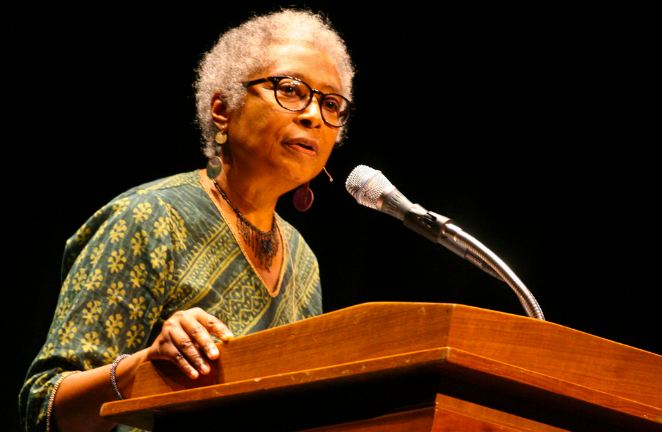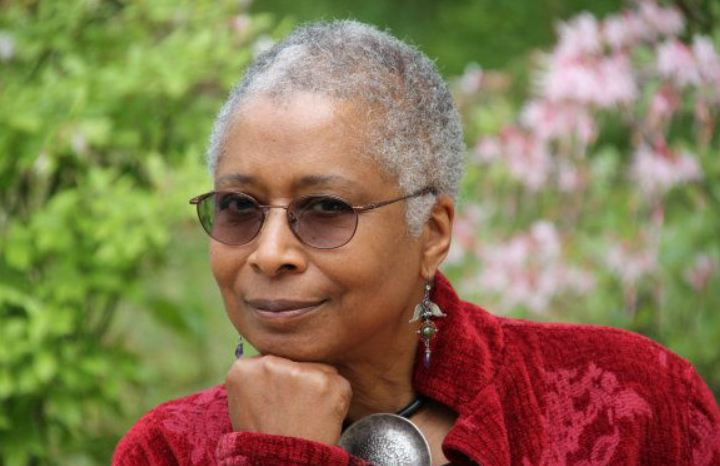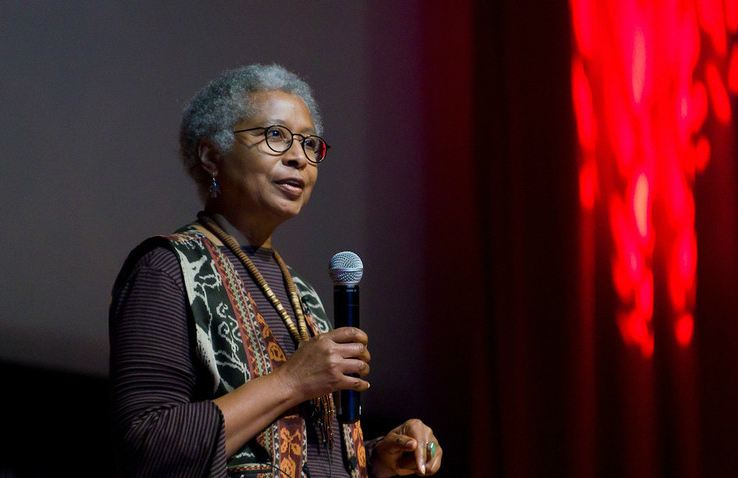How to contact Alice Walker? Alice Walker’s Contact Address, Email ID, Website, Phone Number, Fanmail Address
Hello friends! Are you a follower of Alice Walker? Are you searching on google for How to contact Alice Walker? What is Alice Walker’s WhatsApp number, contact number, or email ID? What is Alice Walker’s hometown and citizenship address? What is Alice Walker’s Facebook, Twitter, or Instagram ID?
Do you have a question; how do I send a fan mail and autograph request to Alice Walker? Please prepare a nice and well-explained autograph request letter. Don’t forget to use simple language and easy-to-understand sentences for quick understanding.
Find out all these things in our article below…
Today I will tell you about HOW TO CONTACT ALICE WALKER.

Willie Lee Walker and Minnie Tallulah (Grant) Walker became parents for the first time on February 9, 1944, when they brought their daughter Alice Malsenior Walker into the world in Eatonton, Georgia. She was the youngest of eight children and the daughter of a sharecropper, a phrase used to refer to a farmer who rents his land. Many of the imaginary characters that Walker invented were based on sharecroppers. She was the youngest child. Walker was only eight years old when her brother accidentally shot her in the eye with a BB gun, leading her to suffer an injury. The incident caused Walker to miss school for a few days.
She retreated from the traditional activities of her childhood. She started writing poetry as an outlet for her emotions of solitude due to her partial blindness, which caused her to withdraw from those activities. She realized that to write; she needed to locate a spot where there was peace, which was difficult for her given that their home had ten people using four rooms simultaneously. She labored in the fresh air for a considerable period, most spent sitting under a tree.
Even though Walker went to segregated schools, which by today’s standards would be regarded as subpar, she mentioned that she had excellent professors who inspired her to think that the utopia she was striving for existed. This led her to believe the utopia she aimed for could be achieved. Even though Walker was raised in a poor household, she could count on the support of her community and the knowledge that she could choose her own identity while she was developing during her childhood.
In addition to this, Ms. Walker was confident that her mother was the one who not only supplied her with the social, spiritual, and moral inspiration for her stories but also gave her the “permission” to become a writer by allowing her to pursue a career in writing. Walker was given the scholarship to attend Spelman College in Atlanta, Georgia, after graduating high school and receiving her diploma. Spelman College is located in the state of Georgia. She got active in the growing Civil Rights movement during her time there, which was a movement that pushed for equal rights for individuals of all racial origins.
In 1963, Walker was presented with an additional scholarship, which enabled her to pursue her undergraduate degree at Sarah Lawrence College in New York. After achieving academic achievement at that institution and completing all her required coursework, she was awarded a bachelor’s degree in 1965. She was a student at Sarah Lawrence College and participated in the exchange program, which allowed her to spend her junior year studying abroad in Africa.
After receiving her diploma, she got a job working for a voter registration drive in the state of Georgia and for the Head Start program in Jackson, Mississippi. Children from households with low incomes are eligible to participate in the educational program known as Head Start. While there, she became acquainted with Melvyn Leventhal, a civil rights lawyer, who would eventually become her husband. They wed in 1967. Rebecca, their only child, was born while the couple was still married and went on to have a successful life after her parents split in 1976.
The year 1968 saw the publication of Walker’s first collection of poems, which bore the title One. Throughout the 1970s, Walker was simultaneously actively engaged in both the teaching and writing professions. During 1968 and 1969, she was a professor in the Black Studies department and a writer-in-residence at Tougaloo College in Mississippi (1968–1969) and Jackson State College in Tennessee (1968–1969). These institutions were located in Mississippi and Tennessee, respectively. (1970–71). She started writing her first book, The Third Life of Grange Copeland (1970) when she was working as a teacher, and she was awarded a grant from the National Endowment for the Arts to help fund the publication of this book.

After that, she relocated to a location further to the north and started her career as a professor in Massachusetts, first at Wellesley College and then later at the University of Massachusetts Boston (1972–73). Her book of short stories, titled “In Love and Trouble: Stories of Black Women,” as well as her collection of poetry, titled “Revolutionary Petunias,” were both published in the same year, 1973. She was awarded a scholarship from the Radcliffe Institute (1971–1973), a prize from the Rosenthal Foundation (1974), and an award from the American Academy and Institute of Arts and Letters for her work on “In Love and Trouble” (1974).
Ruth Copeland, a young African American girl, is the main character of Walker’s first work, which is a novel titled The Third Life of Grange Copeland. The narrative focuses on Ruth has connection with her grandfather, Grange, and how they interact with one another. Grange finds out that he is no longer restricted in his ability to love now that he is an old man; nevertheless, he also learns that love does not come without the terrible responsibility that goes with it.
The defining moment of the narrative is when Grange decides to use the knowledge he has gathered during the novel to protect his granddaughter Ruth from his violent son Brownfield. To stop the destructive conduct cycle, the rescue group demands that Grange murder his child. The main character of “The Color Purple,” Celie, is a lady in such a terrible situation throughout the story that the only way to express her anger and irritation with God is through sending letters to him.
Celie, impoverished, black, female, uneducated, illiterate, and bound down by class and gender, discovers how to bring herself up from a life of sexual exploitation and cruelty with the assistance of the love of another woman, Shug Avery. Walker’s third and most well-known work is “The Color Purple.” Celie is impoverished, black, female, uneducated, illiterate, and bound down by class. To provide context for the story, Celie’s letters include excerpts from another narrative focusing on African customs.

Celie’s husband kept the letters from her sister Nettie during the twenty years that he withheld them from Celie. During that time, Celie could not access her sister Nettie’s notes. In this scene, Walker illustrates women’s problems when connected inside an African society. These ladies face many of the same obstacles as Celie does. Celie and Nettie are reunited, and more importantly, each girl is brought back to who she was before they were separated.
During an interview with Library Journal in 1970, just around the time when Walker’s first book was being published, the author said that “family ties are sacred” to her. This conversation took place in 1970. A sizeable section of Walker’s body of work is dedicated to depicting the emotional, spiritual, and physiological devastation that may ensue from breaking the trust of one’s family. This devastation can hurt all aspects of a person’s life.

Her principal concern is with African American women, who suffer the difficulty of creating independent identities in a culture dominated by males and who live on a giant planet than she does. She sees the world as a much larger place. Even though her characters possess great power, they are nonetheless vulnerable to suffering harm.
Their sensuality, the female friendships, and the fact that they are aware of the debt they owe to their mothers are the sources of their strength. In addition, they are aware of the debt they due to their mothers. These characteristics are highlighted in Walker’s work, along with the challenges women face in their interactions with men who, simply because they are women, consider them to be of lesser significance than they do themselves. The challenges women face in these interactions directly result from the fact that men view women as being of lesser importance than they do themselves.

Alice Walker Fan Mail address:
Alice Walker
David Higham Associates
7th Floor
Waverley House
7–12 Noel Street
London, W1F 8GQ
UK
The use of physical force is an inevitable outcome that directly results from possessing such a worldview. Because of this, the focus of Walker’s stories is not so much on the racial violence between strangers as it is on the violence between friends and family members. This form of violence is a kind of calculated cruelty that is unexpected but is always predictable.
Erica Sutherlin, the director of Stageworks Theatre, is thrilled to present the musical adaption of The Color Purple, which was first released in 2005. This comes at a time when there is a rising trend throughout the country to ban particular publications, which is one reason why. “I think that now is a lovely time to honor the book,” she continues, “I feel that now is an amazing opportunity to appreciate the book and all of its concepts.” The nature of the connection between women in general.
(2) Nickname: Alice Walker
(3) Born: 9 February 1944 (age 79 years), Eatonton, Georgia, United States
(4) Father: Willie Lee Walker
(5) Mother: Minnie Lou Tallulah Grant
(6) Sister: Not Available
(7) Brother: Bobby and Curtis
(8) Marital Status: Married
(9) Profession: Novelist
(10) Birth Sign: Aquarius
(11) Nationality: American
(12) Religion: Christianity
(13) Height: 1.70m
(14) School: Not Available
(15) Highest Qualifications: Not Available
(16) Hobbies: Not Available
(17) Address: Eatonton, Georgia, United States
(18) Contact Number: +44(0)20-7434 5900
(19) Email ID: Not Available
(20) Facebook: https://www.facebook.com/authoralicewalker/
(21) Twitter: https://twitter.com/alicewalker44
(22) Instagram: https://www.instagram.com/successful_writer
(23) Youtube Channel: Not Available
Also Checkout: How to Contact Rebecca Walker: Phone Number, Contact, Whatsapp, Fanmail Address, Email ID, Website
